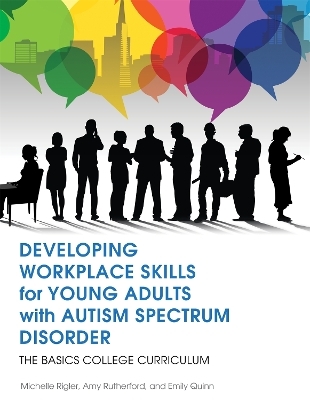
Developing Workplace Skills for Young Adults with Autism Spectrum Disorder
Jessica Kingsley Publishers (Verlag)
978-1-84905-799-8 (ISBN)
The BASICS College Curriculum presents a hands-on approach to learning essential independence and life skills for students and new graduates with Autism Spectrum Disorder (ASD). The fourth book helps young adults to develop strategies for successfully managing workplace challenges, both before they enter the workplace and during employment.
Students or recent graduates are shown how to identify and develop strategies to overcome common challenges associated with ASD in the workplace. These include communication and social interactions with colleagues, working in a team, proactively and successfully managing workload, dealing with stress, and managing their emotions.
Ideal for graduates to use independently or for students in their last year of college, each chapter has a lesson-based progressive structure, providing valuable information and advice for the student, useful diagrams, practical exercises and workbook components that can be filled in at home or in class. Self-assessment tools ensure the skills from each chapter can be reviewed and adjusted as necessary. The book can be used on its own or in conjunction with the other books in the BASICS curriculum for a complete program of self-development.
Michelle Rigler, EdD, is Director of the Disability Resource Center at The University of Tennessee at Chattanooga and Director of the Mosaic Program for students with Autism Spectrum Disorder on which the BASICS Curriculum is based. Amy Rutherford, M.Ed, is Assistant Director and an instructor for the Disability Resource Center's Mosaic Program for students with Autism Spectrum Disorder at the University of Tennessee at Chattanooga. Emily Quinn, M.Ed, is Interim Assistant Director of the Disability Resource Center and serves in the role of coach and instructor for the Mosaic Program for Students with Autism Spectrum Disorder at the University of Tennessee at Chattanooga.
Introduction. 1. Finding your professional niche. Lesson 1: Neurodiversity in the workplace. Lesson 2: Finding a company that works for you. Lesson 3: Creating your optimal work environment. Lesson 4: Professional tool for professional niche development. 2. The interview. Lesson 1: Preparation. Lesson 2: Making the connection. Lesson 3: Follow up. Lesson 4: Professional tool for scripting common interview responses. 3. Disclosure and self-advocacy. Lesson 1: Legal protection and accommodations. Lesson 2: Art of disclosure. Lesson 3: Tell your own story. Lesson 4: Professional tool for navigating disclosure. 4. Professional workplace structure. Lesson 1: Understanding professional communication. Lesson 2: Communication strategies. Lesson 3: Navigating professional miscues. Lesson 4: Professional tool for managing workplace communication. 5. Stress management. Lesson 1: Understanding responsibilities and identifying stressors. Lesson 2: Managing your environment. Lesson 3: Responding to stress in the workplace. Lesson 4: Professional tool for managing stress. 6. Collaboration and teamwork. Lesson 1: The purpose of teamwork. Lesson 2: Individual contributions. Lesson 3: Conflict resolution. Lesson 4: Professional tool for defining your role on a team. 7. Water cooler culture. Lesson 1: The hidden rules. Lesson 2: Learning through casual interactions. Lesson 3: Joining the culture. Lesson 4: Professional tool for creating social rules. 8. Career progression. Lesson 1: Starting over is okay. Lesson 2: Ongoing professional development. Lesson 3: Evaluation and feedback. Lesson 4: Professional tool for professional development. 9. Next steps. Appendix A: Back to BASICS chart/professional example. Appendix B: Guided discussion. Appendix C: Resume tools. Appendix D: Sample interview questions. Bibliography.
| Reihe/Serie | The BASICS College Curriculum |
|---|---|
| Verlagsort | London |
| Sprache | englisch |
| Maße | 217 x 279 mm |
| Gewicht | 579 g |
| Themenwelt | Sachbuch/Ratgeber ► Gesundheit / Leben / Psychologie ► Krankheiten / Heilverfahren |
| Medizin / Pharmazie ► Medizinische Fachgebiete ► Neurologie | |
| Sozialwissenschaften ► Pädagogik ► Berufspädagogik | |
| Sozialwissenschaften ► Pädagogik ► Sonder-, Heil- und Förderpädagogik | |
| ISBN-10 | 1-84905-799-0 / 1849057990 |
| ISBN-13 | 978-1-84905-799-8 / 9781849057998 |
| Zustand | Neuware |
| Haben Sie eine Frage zum Produkt? |
aus dem Bereich


